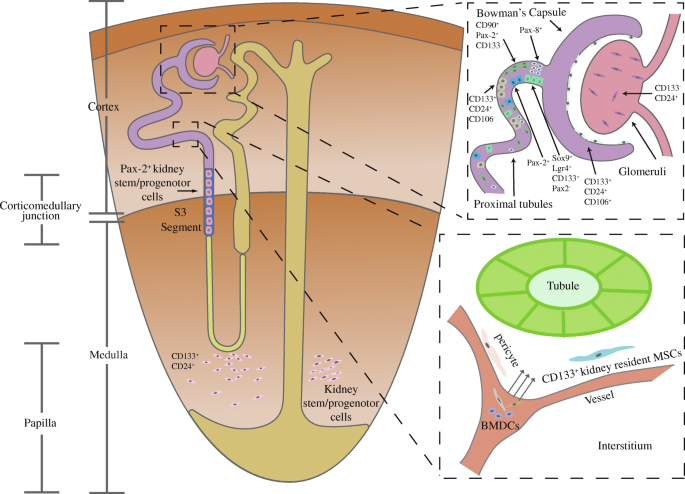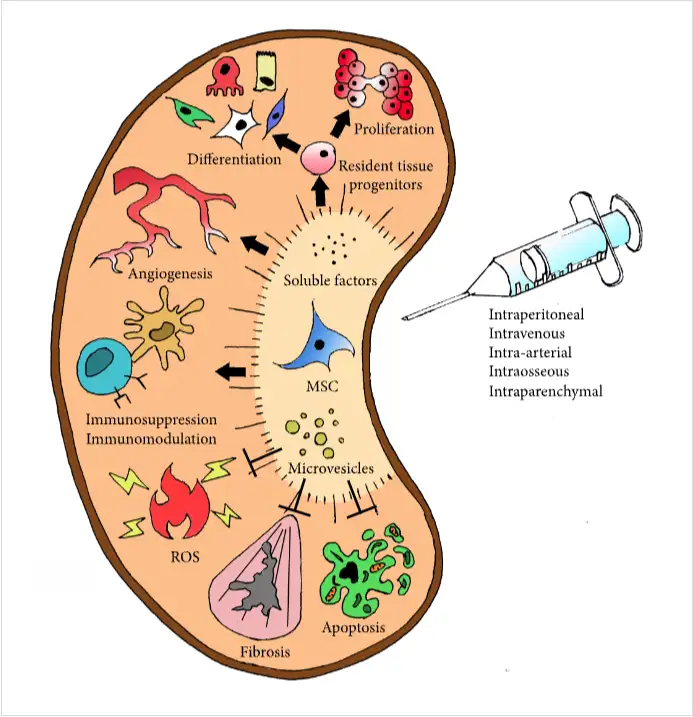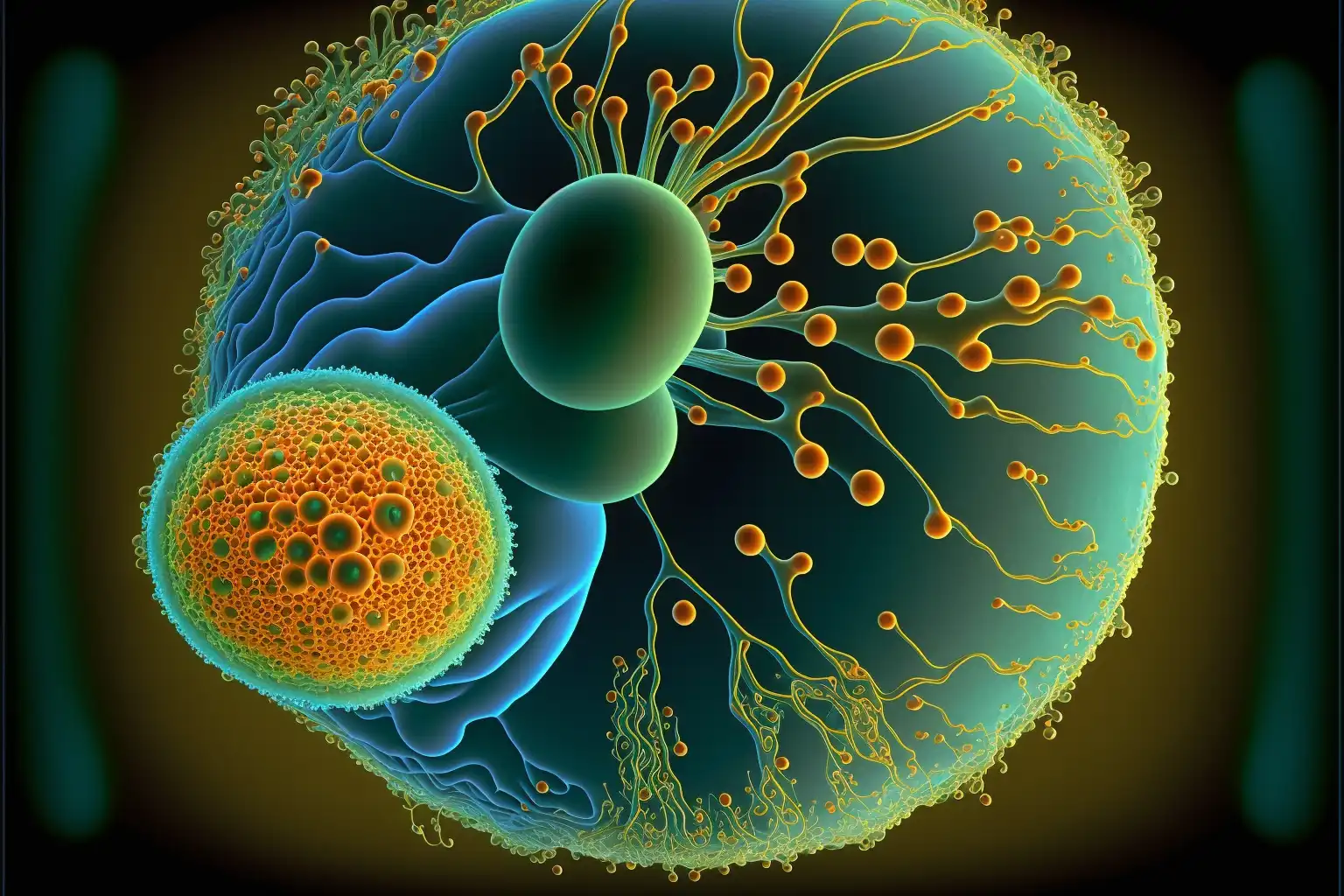A Way to Better Outcomes
Kidney Transplantation
Kidney transplantation is a life saving treatment for patients with kidney failure but the demand for transplantation and shortage of organ donors means patients wait 3 years for a transplant.
Many patients become too unwell for surgery during this wait and are taken off the transplant list.
Older donor kidneys can’t recover their function after transplant and live shorter times than young donor kidneys.
Improving older donor kidneys could increase the number of available kidneys and make transplanted kidneys work for longer. Advances in surgical techniques, particularly for kidney transplants, are showing promise in better outcomes. These include techniques that get rid of long term immunosuppressive drugs and the dual immune/solid organ transplant method which is especially good for kids with rare immune diseases.
Stem Cells and Kidney Diseases
Stem cells can repair or replace damaged tissues and neonatal stem cells can become kidney cells.
Stem cell therapy uses special cells to repair or replace damaged tissues and neonatal stem cells can be collected from premature baby urine.
Stem cells can also interact with immune cells to modulate immune responses and promote tissue repair. The cells can become kidney cells and have been shown to start regeneration in treated kidneys.
Stem cells from different sources are promising for kidney diseases but more research is needed to determine the best transplanted stem cells.

Stem Cell Sources and Types
Stem cells are a tool for therapeutic applications in kidney diseases offering various sources and types. Embryonic stem cells from the inner cell mass of a blastocyst can differentiate into any cell type making them very versatile. Induced pluripotent stem cells are adult cells reprogrammed to regain this pluripotency providing a less controversial alternative to embryonic stem cells. Adult stem cells found in various tissues including bone marrow can differentiate into multiple cell types including kidney cells. Each type of stem cell has its advantage and challenges and ongoing research is to determine the best source for kidney diseases.
Bone Marrow Derived Stem Cells in Kidney Transplant Bone marrow derived stem cells (BMSCs) have been shown to improve kidney function and structure in animal models of kidney disease.
Historically stem cell transplants have had challenges such as graft versus host disease but recent advancements including new approaches by the Stanford pediatric team have improved the safety and efficacy of these transplants especially for patients requiring both stem cell and kidney transplants.
In some cases a stem cell transplant may be used with kidney transplantation to enhance immune tolerance and outcomes.
BMSCs can differentiate into various cell types including kidney cells and also secrete factors that promote kidney repair and regeneration.
Use of BMSCs in kidney transplantation can improve graft function and kidney transplant survival and also reduce the need for immunosuppressive drugs.
Kidney Transplant Tolerance
Kidney transplant tolerance is a state in which the immune system accepts the transplanted kidney as its own eliminating the need for immunosuppressive drugs.
Use of stem cells especially hematopoietic stem cells has been shown to promote kidney transplant tolerance in animal models which is called Xenotransplantation.
The UCLA Health kidney transplantation team has developed a revolutionary treatment that uses donor stem cells and radiation therapy to get the immune system to accept a transplanted kidney.
Improving Donor Kidney Condition with Stem Cells
Dr. Sarah Hosgood from the University of Cambridge is investigating whether stem cells from premature baby urine can improve the condition of kidneys from older donors for transplant. The integration of kidney and stem cells in transplantation research aims to increase the viability and function of donor kidneys. The research aims to improve the condition of kidneys from older donors increasing the pool of available kidneys and make transplanted kidneys work for longer.
The study will use neonatal stem cells to repair and regenerate kidney cells in donated kidneys.
Stem Cell Therapy for Chronic Kidney Disease
Stem cell therapy is a promising solution for patients with chronic kidney disease (CKD) which can progress to end stage renal disease (ESRD). Traditional CKD treatments often manage symptoms rather than the underlying issue. Stem cell therapy is a revolutionary approach to repair or replace damaged kidney tissue.This uses multiple stem cell types. Embryonic stem cells (ESCs) can differentiate into any cell type including kidney cells but have ethical concerns and tumour risks. Induced pluripotent stem cells (iPSCs) reprogrammed from adult cells are a less controversial option and reduce immune rejection risks as they can be derived from the patient’s own cells.
Mesenchymal stem cells (MSCs) found in adult tissues like bone marrow are another option. They can differentiate into kidney cells and promote tissue repair with low rejection risk. Renal stem/progenitor cells (RSPCs) found in the kidney are best suited for repairing kidney tissue and also minimize rejection risks.
Stem cell therapy can transform CKD treatment and offer better outcomes and quality of life for patients.

Stem Cell Innovations
Recent stem cell innovations are making treatments for chronic kidney disease (CKD) safer and more efficient. A major challenge in stem cell therapy is the risk of tumour formation but advancements in induced pluripotent stem cells (iPSCs) and mesenchymal stem cells (MSCs) are reducing this risk.
To further minimize rejection risk researchers are refining immunosuppressive strategies. These are crucial to get transplanted stem cells to be accepted by the patient’s immune system without adverse effects.
Gene editing technologies like CRISPR/Cas9 have revolutionized the field by allowing precise genetic corrections in iPSCs. This makes stem cell therapy safer and enables better disease modelling including CKD.
Another breakthrough is microfluidic organ-on-a-chip technology which creates miniature organ models like kidneys for research and drug testing.
Scaffolds are temporary physical support structures that guide cell and tissue growth and can be a new source of transplantable kidney tissue.
These innovations are not only making stem cell therapy work for CKD but also opening new research avenues and bringing us closer to clinical solutions.Regenerative medicine is a field of repair or replacement of damaged tissues and organs and has great promise for kidney disease treatment. Stem cells play a key role in this field and can repair or replace damaged kidney tissue. In patients with chronic kidney disease stem cell therapy has shown promising results improving kidney function and slowing disease progression. Researchers are also exploring stem cells to generate kidney tissue in vitro which could revolutionize kidney transplantation by providing a new source of transplantable tissue. As regenerative medicine progresses we hope to have better treatments for kidney diseases and better patient outcomes and quality of life.
Ethical Issues in Stem Cell Research
Stem cell research is promising but raises several ethical issues that need to be navigated. The use of embryonic stem cells which are derived from human embryos sparks debates about the morality of destroying human life. The potential for stem cells to form tumours (teratomas) is a major safety concern for stem cell therapy. Beyond therapeutic uses the possibility of using stem cells for non-therapeutic purposes like cloning complicates the ethical landscape. As the field progresses we need to address these ethical issues to ensure stem cell research and therapy is conducted responsibly and with respect for human life and dignity.
Challenges and Future Directions
Stem cells in kidney transplantation is still in its early days and there are many challenges to be overcome before it can be a widely accepted treatment. Patients with prior kidney transplant face challenges with immune rejection which stem cell therapy aims to address.
More research is needed to determine the best source and type of stem cells to use and the best way to deliver them to the kidney.
The risks and benefits of stem cell therapy in kidney transplantation need to be carefully evaluated.
Patient Outcomes and Quality of Life Post-TransplantPatient outcomes and quality of life post-transplant is a major consideration in kidney disease treatment. Stem cell therapy has shown to improve kidney function and reduce complications in patients with chronic kidney disease. By improving kidney function stem cell therapy can alleviate symptoms and overall health and improve patient’s quality of life. But while initial results are promising more research is needed to understand long term outcomes and quality of life post-transplant. To ensure patients not just survive but thrive after a kidney transplant is the ultimate goal and stem cell therapy may be a key to achieving that.

Meet the Team
Our team consists of top transplant surgeons, nephrologists, urologists and hematologists in the US. Our team also has experience in solid organ transplant procedures and combines expertise in both kidney and stem cell therapies. We focus on advancements in solid organ transplants particularly kidney transplantation using unique procedures that allow for organ acceptance without long term immunosuppressive drugs. This is achieved by collaboration of specialized multidisciplinary teams to improve patient outcomes.
We work together to deliver groundbreaking kidney transplantation, radiation therapy and stem cell infusions.
Conclusion
Stem cell therapy has immense promise as a clinical alternative for kidney disease.
The kidney organoids induced by stem cells provide authentic and practical model for investigating kidney development and disease. The advancements in stem cell therapy can revolutionize the field of organ transplants and offer new hope for patients with organ failures.
More research is needed to confirm long term safety and examine risks of fibrosis, maldifferentiation or malignancy.
Resources:
- National Kidney Foundation – www.kidney.org
- Provides comprehensive information on kidney health, kidney diseases, and transplantation.
- American Society of Nephrology – www.asn-online.org
- Offers resources and research updates on kidney health and treatments.
- UCLA Health Kidney Transplant Program – www.uclahealth.org
